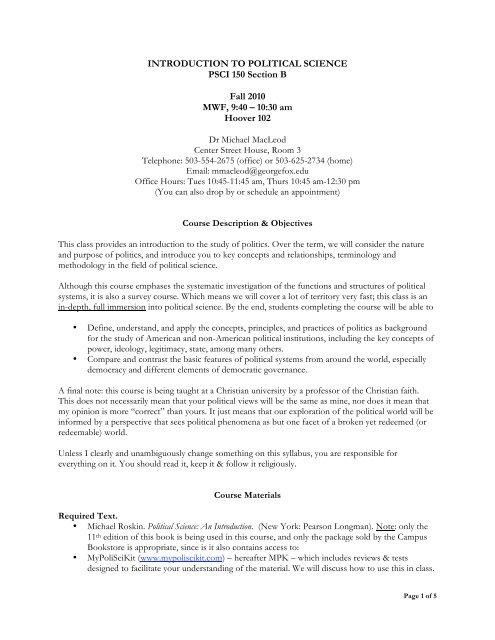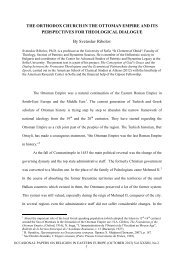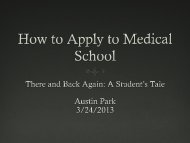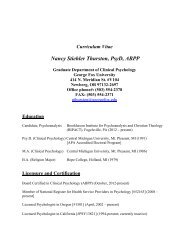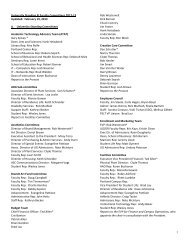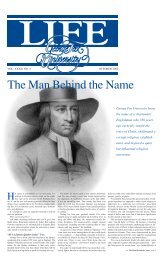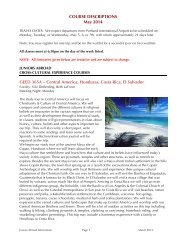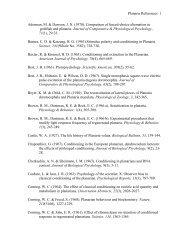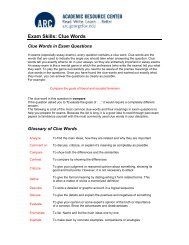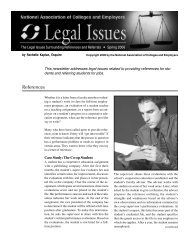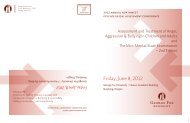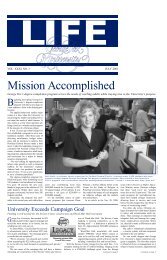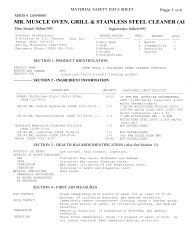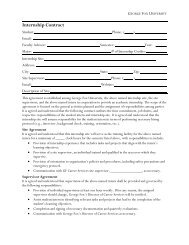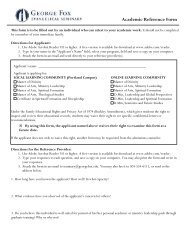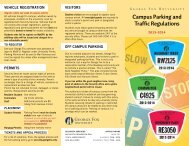INTRODUCTION TO POLITICAL SCIENCE PSCI 150 Section B Fall ...
INTRODUCTION TO POLITICAL SCIENCE PSCI 150 Section B Fall ...
INTRODUCTION TO POLITICAL SCIENCE PSCI 150 Section B Fall ...
Create successful ePaper yourself
Turn your PDF publications into a flip-book with our unique Google optimized e-Paper software.
<strong>INTRODUCTION</strong> <strong>TO</strong> <strong>POLITICAL</strong> <strong>SCIENCE</strong><br />
<strong>PSCI</strong> <strong>150</strong> <strong>Section</strong> B<br />
<strong>Fall</strong> 2010<br />
MWF, 9:40 – 10:30 am<br />
Hoover 102<br />
Dr Michael MacLeod<br />
Center Street House, Room 3<br />
Telephone: 503-554-2675 (office) or 503-625-2734 (home)<br />
Email: mmacleod@georgefox.edu<br />
Office Hours: Tues 10:45-11:45 am, Thurs 10:45 am-12:30 pm<br />
(You can also drop by or schedule an appointment)<br />
Course Description & Objectives<br />
This class provides an introduction to the study of politics. Over the term, we will consider the nature<br />
and purpose of politics, and introduce you to key concepts and relationships, terminology and<br />
methodology in the field of political science.<br />
Although this course emphases the systematic investigation of the functions and structures of political<br />
systems, it is also a survey course. Which means we will cover a lot of territory very fast; this class is an<br />
in-depth, full immersion into political science. By the end, students completing the course will be able to<br />
• Define, understand, and apply the concepts, principles, and practices of politics as background<br />
for the study of American and non-American political institutions, including the key concepts of<br />
power, ideology, legitimacy, state, among many others.<br />
• Compare and contrast the basic features of political systems from around the world, especially<br />
democracy and different elements of democratic governance.<br />
A final note: this course is being taught at a Christian university by a professor of the Christian faith.<br />
This does not necessarily mean that your political views will be the same as mine, nor does it mean that<br />
my opinion is more “correct” than yours. It just means that our exploration of the political world will be<br />
informed by a perspective that sees political phenomena as but one facet of a broken yet redeemed (or<br />
redeemable) world.<br />
Unless I clearly and unambiguously change something on this syllabus, you are responsible for<br />
everything on it. You should read it, keep it & follow it religiously.<br />
Course Materials<br />
Required Text.<br />
• Michael Roskin. Political Science: An Introduction. (New York: Pearson Longman). Note: only the<br />
11 th edition of this book is being used in this course, and only the package sold by the Campus<br />
Bookstore is appropriate, since is it also contains access to:<br />
• MyPoliSciKit (www.mypoliscikit.com) – hereafter MPK – which includes reviews & tests<br />
designed to facilitate your understanding of the material. We will discuss how to use this in class.<br />
Page 1 of 5
Other Required Reading.<br />
• For class discussions and for testing, you are required to follow current political issues & events<br />
by regularly reading: The New York Times (online at www.nytimes.com, free registration) and<br />
some of the articles (your choice and/or at my suggestion) posted daily at<br />
www.RealClearPolitics.com. The latter website is a ‘clearinghouse’ for political information and<br />
tries to balance views from a variety of perspectives. If you wish for a more interesting political<br />
news website, the best known political blogger (and site is) Andrew Sullivan at the Daily Dish:<br />
http://andrewsullivan.theatlantic.com<br />
• Other readings for the course may be uploaded by me to FoxTALE (see below).<br />
FoxTALE.<br />
• The FoxTALE site for this course will be the main communication interface between you and<br />
the course materials. In addition to the syllabus, I will upload lecture notes (powerpoint slides)<br />
regularly there, post grades, etc. I will also post additional articles (beyond the text) to read and<br />
will notify you appropriately. The site will be made functional after the first week of classes.<br />
Course Requirements & Grading<br />
Attendance.<br />
Students are expected to attend class regularly. Attendance will be taken for every class after the first one<br />
(using sign-up sheets) and more than 4 absences during the term (there will be about 40 classes in all) will<br />
result in a deduction of 1% from your final grade. More than 8 absences will result in a deduction of 5%<br />
from your final grade. No exceptions to this will be unless there is a medical note verifying an illness that<br />
required time away from class.<br />
Participation.<br />
Proper note-taking and active participation in class are essential for success in this course. The use of<br />
laptops is allowed but not their use for non-classroom related activities, i.e. checking email or facebook,<br />
etc. If you use a laptop in class, I will be periodically ask you to email me (or my assistant) your notes.<br />
The main reason for this is that students in past classes have complained to me about others using their<br />
laptops for facebook, videos, etc, during class and distracting them. Failure to abide by this expectation<br />
will result in a warning and penalty (a deduction of 1% per violation after warning). Lecture powerpoint<br />
slides are posted to FoxTALE regularly, however, these are not detailed notes, just general outlines and<br />
key points, therefore it is imperative that you take good notation of my lecture points and integrate these<br />
with your other readings (of the textbook, online, etc).<br />
Because this is a lecture-based course with more than 30 students, I don’t expect that each student will<br />
be able to fully participate in each and every class. However, because I want to strongly encourage quality<br />
participation (meaning: not just talking but engaging the subject matter in a timely and helpful manner)<br />
and because we will be discussing not just theory but practical, political matters as they arise, I will give<br />
bonuses to students who make regular contributions to the class (adding 1% to their final grade) and<br />
those who show superb contributions (adding 2% to their final grade). Please note: this is not a reward<br />
to students who are merely more talkative and more extroverted than others. Blowing random hot air<br />
into the class in the form of making obvious points or talking because you like to hear your own voice<br />
are not valuable contributions. If you have concerns or wonder if your participation is making a<br />
difference (my definition of ‘contribution’) please feel free to talk to me.<br />
Page 2 of 5
Textbook Online Quizzes.<br />
Students are required to read the textbook according to the schedule laid out below. The MPK site has<br />
online tests (multiple choice and true/false) for you to take for each chapter. These can be taken openbook<br />
and are designed so that you can do them at your own pace as you read the chapter. The purpose<br />
of these quizzes is to prepare you for a) in-class lectures & discussions and b) for in-class tests and<br />
examinations (described below). It is up to you to take advantage of this tool. My assistant will be<br />
monitoring who is (or isn’t) using this resource, and I will be encouraging (exposing) you in class to<br />
utilize it. Plus, you paid for this help when you purchased the textbook.<br />
In-class Tests.<br />
Starting in week 2, I will administer in-class tests about once a week or so until a week or two before the<br />
term ends. These will be short (10-15 minute) quizzes (fill-in-the-blank and/or multiple-choice) that will<br />
test you on course matter taken in the previous few classes and on the material in the textbook and/or<br />
readings (as per above) and on current political events as discussed in class and in the online sources<br />
noted above. There will be approximately 10 tests, and these will be worth 35% of your grade. I will<br />
count the top 7 quizzes (we will discount the three lowest grades, including those you might miss<br />
because of illness or non-attendance). Thus, each of these tests will be worth 5% of your final grade.<br />
Examinations.<br />
Two exams are scheduled in this class. The mid-term exam will be held on Friday, October 15. It will<br />
be 50 minutes in length and worth 25% of your grade. The final exam (which is comprehensive) will be<br />
held during Final Exams Week (Dec 10-14) is two hours long and worth 40% of the final grade.<br />
Exams will consist of some combination of fill-in-the-bank, multiple choice, true/false, short answer<br />
and/or essay questions. You are responsible for all of the material covered in the classes and the assigned<br />
readings.<br />
Note: Students who miss an exam must present a medical or counseling certificate in order to avoid<br />
receiving an F. Any missed exam will have to be rescheduled immediately.<br />
Grading Scale.<br />
A final letter grade based upon the percentage of overall points you earn in this course will be based on<br />
this scale:<br />
A 93-100<br />
A- 90-92.99<br />
B+ 87-89.99<br />
B 83-86.99<br />
B- 80-82.99<br />
C+ 77-79.99<br />
C 73-76.99<br />
C- 70-72.99<br />
D+ 67-69.99<br />
D 60-66.99<br />
F 0-59.99<br />
Course Schedule<br />
Below you will find the relevant weeks and themes for the class and the required readings from the<br />
course textbook. Please note: these represent the basic framework of the course and I will not be simply<br />
re-hashing what the textbook says. Instead, I will be highlighting some points I think worth noting but<br />
will also occasionally discuss items (issues, terms, thinkers) that are not in the text, thus attendance at<br />
class (and review of lecture slides) is important. Moreover, this schedule will undoubtedly change as we<br />
go forward.<br />
Page 3 of 5
Week 1 (Aug 30, Sept 1, 3): Introducing Politics and Political Science<br />
Readings:<br />
• Roskin, Chapter 1<br />
• FoxTALE readings<br />
Weeks 2-3 (Sept 6, 10, 13, 15, 17): Political Theories, Theorists and Ideologies<br />
Readings:<br />
• Roskin, Chapters 2 and 3<br />
• FoxTALE readings<br />
Week 4 (Sept 20, 22, 24): Political Systems – States<br />
Readings:<br />
• Roskin, Chapter 4<br />
• FoxTALE readings<br />
Week 5 (Sept 27, 29, Oct 1): Political Systems – Constitutions and Regimes<br />
Readings:<br />
• Roskin, Chapters 5 and 6<br />
• FoxTALE readings<br />
Week 6 (Oct 4, 6): Political Culture<br />
Readings:<br />
• Roskin, Chapter 7<br />
• FoxTALE readings<br />
Week 7 (Oct 11, 13): Political Communication and Public Opinion<br />
Readings:<br />
• Roskin, Chapters 8 and 9<br />
• FoxTALE readings<br />
Mid-Term Exam: Friday, October 15<br />
Week 8 (Oct 18, 20, 22): Interest Groups<br />
Readings:<br />
• Roskin, Chapter 10<br />
• FoxTALE readings<br />
Week 9 (Oct 25, 27, 29): Political Parties and Electoral Systems<br />
Readings:<br />
• Roskin, Chapter 11<br />
• FoxTALE readings<br />
Page 4 of 5
Week 10 (Nov 1, 3, 5): Voting and Elections<br />
Readings:<br />
• Roskin, Chapter 12<br />
• FoxTALE readings<br />
Week 11 (Nov 8, 10, 12): Legislatures<br />
Readings:<br />
• Roskin, Chapter 13<br />
• FoxTALE readings<br />
Weeks 12-13 (Nov 15, 17, 19, 22, 24): Executives, Bureaucracies and Judiciaries<br />
Readings:<br />
• Roskin, Chapters 14 and 15<br />
• FoxTALE readings<br />
Weeks 14-15 (Nov 29, Dec 1, 3, 6, 8, 10): Politics Outside: International Relations<br />
Readings:<br />
• Roskin, Chapter 18<br />
• FoxTALE readings<br />
Final Exam: week of Dec 10-14<br />
Other Important Information<br />
If you have specific physical, psychiatric, or learning disabilities and require accommodations, please<br />
contact the Disability Services Office as early as possible so that your learning needs may be<br />
appropriately met. You will need to provide current documentation of your disability to the Disability<br />
Services Office. For more information, go to ds.georgefox.edu or contact Rick Muthiah, Dean of the<br />
Center for Teaching and Learning (503-554-2314 or rmuthiah@georgefox.edu).<br />
The university deals strongly with cases of cheating & plagiarism. Stress is no excuse, so it’s better to<br />
discuss with me (and other appropriate people) before temptation hits.<br />
The Academic Resource Center (ARC) provides all students with free writing consultation, general<br />
tutoring, and learning enhancement strategies (e.g., techniques to improve reading, note-taking, study,<br />
time management). Students can make an appointment with the ARC Writing Center for guidance and<br />
feedback on written projects. ARC consultants can also provide basic tutoring for many general<br />
education and other courses. Go to www.georgefox.edu/arc/ for information about consultants’ areas<br />
of study, how to schedule an appointment, and helpful learning tools. Call Rick Muthiah, Director of the<br />
Academic Resource Center, at x2314 if you have questions.<br />
Page 5 of 5


